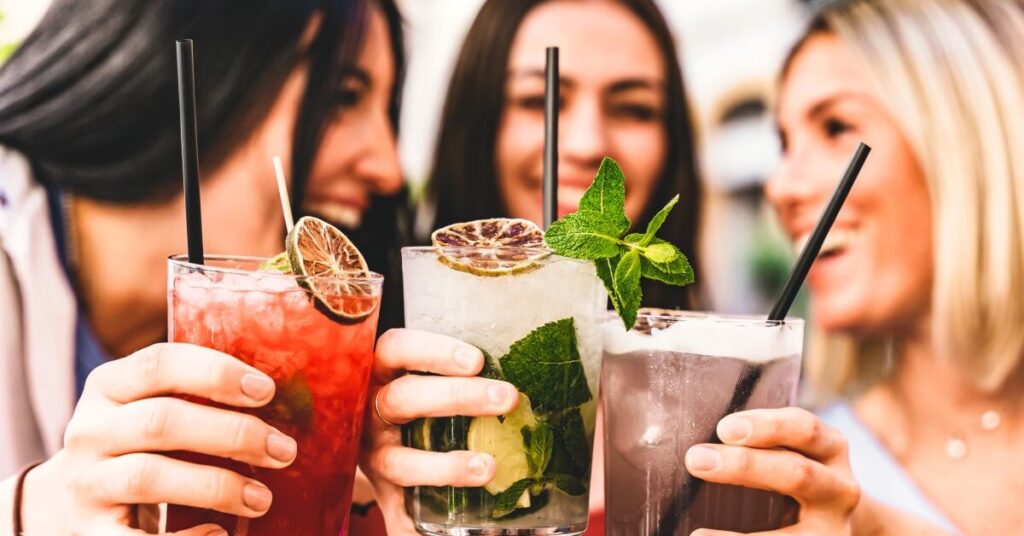
Overview
Alcohol consumption is typical in social gatherings and celebrations, but excessive drinking can lead to various health problems and negatively impact overall well-being.[1]
If you want to reduce alcohol consumption for health reasons, financial savings, or personal goals, you can implement several practical strategies.
Here, we will discuss 10 tips to help you reduce your alcohol intake and positively change your life. Let’s get started!
- Set Clear Goals
Start by setting clear and achievable goals for yourself. Determine how many days a week you want to abstain from alcohol and how many drinks you’re comfortable having on the days you indulge.
Setting specific goals will give you a sense of direction and help you stay accountable.
- Word Power
Keeping a journal can be a powerful tool in your journey to cut back on alcohol.[2]
Record the days you drink, the number of drinks you consume, and the situations or emotions that trigger your drinking.
This approach will help you identify patterns and make necessary adjustments.
- Choose Alcohol-Free Alternatives
Opt for alcohol-free alternatives such as mocktails, sparkling water, or non-alcoholic beer when socializing or relaxing at home.[1]
These alternatives can provide a similar sensory experience without the adverse effects of alcohol.[1]
- Avoid Triggers
Identify the situations or places that encourage drinking and try to avoid them, at least initially.
If you usually drink when stressed, explore healthier stress-management techniques like meditation, exercise, or talking to a friend.
- Plan Activities
Fill your time with activities that don’t involve alcohol. Engaging in hobbies, sports, or volunteering can divert your focus from drinking and introduce you to new, fulfilling experiences.
- Communicate with Friends and Family
Share your goals with friends and family so they can support your efforts to cut back on alcohol. Having a supportive network can make a significant difference in your success.
- Create a Sober Social Circle
Consider spending time with friends who share your desire to reduce alcohol consumption.
Surrounding yourself with people who respect your goals can make it easier to stick to your plan.
- Practice Mindfulness
Mindfulness techniques, such as deep breathing and meditation, can help you become more aware of your thoughts, feelings, and cravings.[3]
This self-awareness can empower you to make better choices and resist the urge to drink excessively.
- Set Limits
Establish clear limits for yourself when you do choose to drink.
For example, you can decide to have only one or two drinks per occasion and stick to it. Setting limits ensures that you stay within your defined boundaries.
- Seek Help
If you find it challenging to cut back on alcohol despite your best efforts, consider seeking professional help.
A therapist or counselor can provide guidance, support, and coping strategies to address the underlying issues contributing to your alcohol consumption.[4]

The Takeaway
Reducing alcohol consumption can positively impact your physical and mental well-being.
By setting clear goals, staying mindful of your triggers, and seeking support from friends and professionals, you can successfully cut back on alcohol and enjoy a healthier, more fulfilling lifestyle.
Remember that change takes time, so be patient with yourself and celebrate your progress.
References:
- Hendriks H. F. J. (2020). Alcohol and Human Health: What Is the Evidence?. Annual review of food science and technology, 11, 1–21. https://doi.org/10.1146/annurev-food-032519-051827
- Faccio, E., Turco, F., & Iudici, A. (2019). Self-writing as a tool for change: the effectiveness of a psychotherapy using diary. Research in psychotherapy (Milano), 22(2), 378. https://doi.org/10.4081/ripppo.2019.378
- Keng, S. L., Smoski, M. J., & Robins, C. J. (2011). Effects of mindfulness on psychological health: a review of empirical studies. Clinical psychology review, 31(6), 1041–1056. https://doi.org/10.1016/j.cpr.2011.04.006
- Sobell, M. B., & Sobell, L. C. (1973). Alcoholics treated by individualized behavior therapy: one year treatment outcome. Behaviour research and therapy, 11(4), 599–618. https://doi.org/10.1016/0005-7967(73)90118-6

